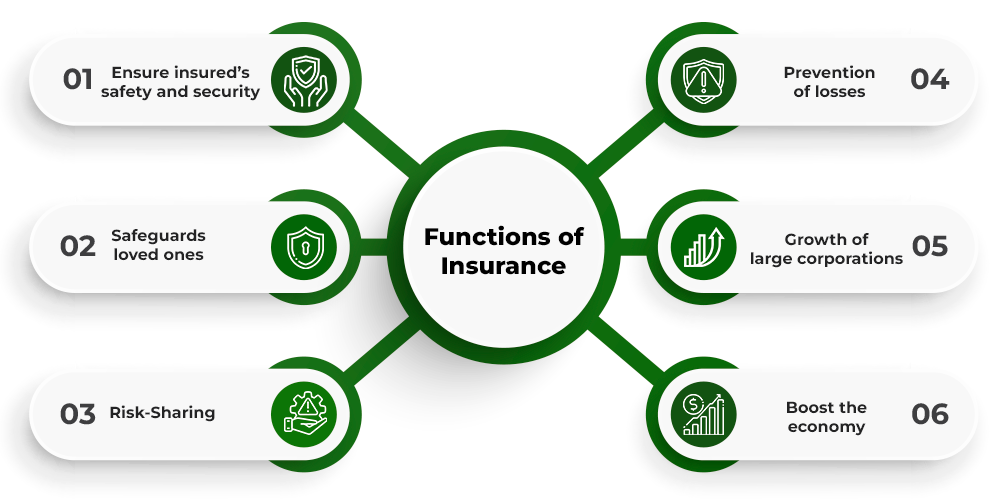Insurance : Meaning, Definitions and Functions
Last Updated :
07 Mar, 2024
What is Insurance?
Insurance is a method that spreads the loss likely to be caused by an unknown occurrence among a number of people who are exposed to it and plan to protect themselves against it. It is a contract or agreement in which one party promises to pay an agreed amount of money to another party in exchange for compensation to make a loss, damage, or harm to anything of value in which the insured has a financial interest as a result of some unpredictable event.
Insurance is a legal contract (insurance policy) agreed upon between the two parties, namely the insurance firm (also known as the insurer) and the individual or group (known as insured). Both of these parties enter into a contract in which the insured pays the insurer a predetermined sum of money (known as a premium) with the promise that the company will compensate the insured in the occurrence of a financial loss (risk) due to the causes for which the insurer has agreed to provide coverage. Businesses require customised insurance plans that protect them against distinct sorts of hazards.

Definition of Insurance
According to Henry James, Jr., “Insurance – an ingenious modern game of chance in which the player is permitted to enjoy the comfortable conviction that he is beating the man who keeps the table.”
According to Elbert Hubbard, “Insurance is a contract, represented by a policy, in which an individual or entity receives financial protection or reimbursement against losses from an insurance company.”
Functions of Insurance
The functions of Insurance are as follows:
1. Ensure the Insured’s Safety and Security:
One of the primary reasons for enrolling into an insurance contract is to obtain financial protection in the case of a loss due to an unexpected disaster. Insurance provides assistance to policyholders and aids in lowering the uncertainties in a company or people’s lives. The insured party is protected against future dangers, vulnerabilities, and accidents with the aid of a policy. Although no insurer in the world can prevent a potentially hazardous event from occurring, they can certainly assist by providing some form of financial protection to compensate the insured party.
2. Safeguards Loved Ones:
Medical insurance can assist you and your family in receiving appropriate care and covering hospitalisation costs. It aids in the care of their health in the event of an accident, sickness, or other unforeseen incidents. The well-being of your family comes first, and insurance may help you take care of it in the best way possible.
3. Risk-Sharing:
The risk is unpredictable, and hence the loss resulting from it is also uncertain. When risk takes place, the loss is shared by all the individuals who are exposed to the risk. In ancient times, risk-sharing occurred only when there was damage or death; however, nowadays, depending on the possibility of risk, (the share is received from each insured in the form of premium, without the paying premium by the insured protection is not guaranteed by the insurer.
4. Prevention of Losses:
It allows firms to have a backup plan in case things don’t go as planned. Insurance is a critical tool for businesses because it helps them to cover their bases while operating in a high-risk environment where losses can be catastrophic if they do not play their cards correctly. It also enables them to cover these enormous risks in their enterprises by paying a very small amount of premium.
5. Growth of Large Corporations:
Any huge organisation is more vulnerable to danger. If the possibilities of loss are substantially larger, it may prevent management in those organisations from taking calculated risks that have the potential to bring in more revenues. Insurance helps to limit risk in some ways and encourages organisations to make risky decisions. Insurance relieves some of the financial stress and helps firms to flourish in the long run.
6. Boost the Economy:
When firms have enough insurance coverage, they may expand their scope of economic activity, resulting in proportional rewards. In the long run, this might offer a boost to a country’s total economy.
Like Article
Suggest improvement
Share your thoughts in the comments
Please Login to comment...